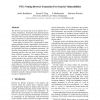Free Online Productivity Tools
i2Speak
i2Symbol
i2OCR
iTex2Img
iWeb2Print
iWeb2Shot
i2Type
iPdf2Split
iPdf2Merge
i2Bopomofo
i2Arabic
i2Style
i2Image
i2PDF
iLatex2Rtf
Sci2ools
124
click to vote
USS
2010
2010
VEX: Vetting Browser Extensions for Security Vulnerabilities
The browser has become the de facto platform for everyday computation. Among the many potential attacks that target or exploit browsers, vulnerabilities in browser extensions have received relatively little attention. Currently, extensions are vetted by manual inspection, which does not scale well and is subject to human error. In this paper, we present VEX, a framework for highlighting potential security vulnerabilities in browser extensions by applying static information-flow analysis to the JavaScript code used to implement extensions. We describe several patterns of flows as well as unsafe programming practices that may lead to privilege escalations in Firefox extensions. VEX analyzes Firefox extensions for such flow patterns using high-precision, context-sensitive, flow-sensitive static analysis. We analyze thousands of browser extensions, and VEX finds six exploitable vulnerabilities, three of which were previously unknown. VEX also finds hundreds of examples of bad programming ...
Related Content
| Added | 15 Feb 2011 |
| Updated | 15 Feb 2011 |
| Type | Journal |
| Year | 2010 |
| Where | USS |
| Authors | Sruthi Bandhakavi, Samuel T. King, P. Madhusudan, Marianne Winslett |
Comments (0)

